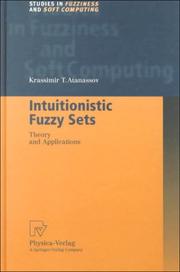| Listing 1 - 3 of 3 |
Sort by
|

ISBN: 3790812285 3790824631 3790818704 Year: 1999 Volume: 35 Publisher: Heidelberg ; New York : Physica-Verlag,
Abstract | Keywords | Export | Availability | Bookmark
 Loading...
Loading...Choose an application
- Reference Manager
- EndNote
- RefWorks (Direct export to RefWorks)
In the beginning of 1983, I came across A. Kaufmann's book "Introduction to the theory of fuzzy sets" (Academic Press, New York, 1975). This was my first acquaintance with the fuzzy set theory. Then I tried to introduce a new component (which determines the degree of non-membership) in the definition of these sets and to study the properties of the new objects so defined. I defined ordinary operations as "n", "U", "+" and "." over the new sets, but I had began to look more seriously at them since April 1983, when I defined operators analogous to the modal operators of "necessity" and "possibility". The late George Gargov (7 April 1947 - 9 November 1996) is the "god father" of the sets I introduced - in fact, he has invented the name "intu itionistic fuzzy", motivated by the fact that the law of the excluded middle does not hold for them. Presently, intuitionistic fuzzy sets are an object of intensive research by scholars and scientists from over ten countries. This book is the first attempt for a more comprehensive and complete report on the intuitionistic fuzzy set theory and its more relevant applications in a variety of diverse fields. In this sense, it has also a referential character.
Fuzzy sets. --- Ensembles flous --- Computing --- Intuitionistic fuzzy sets --- Fuzziness --- Soft computing --- Fuzzy logic. --- FUZZY LOGIC --- Nonlinear logic --- Fuzzy mathematics --- Logic, Symbolic and mathematical --- Fuzzy systems --- Cognitive computing --- Electronic data processing --- Computational intelligence --- Sets, Fuzzy --- Set theory --- Monograph --- Mathematical logic. --- Discrete mathematics. --- Artificial intelligence. --- Economic theory. --- Mathematical Logic and Foundations. --- Discrete Mathematics. --- Artificial Intelligence. --- Economic Theory/Quantitative Economics/Mathematical Methods. --- Economic theory --- Political economy --- Social sciences --- Economic man --- AI (Artificial intelligence) --- Artificial thinking --- Electronic brains --- Intellectronics --- Intelligence, Artificial --- Intelligent machines --- Machine intelligence --- Thinking, Artificial --- Bionics --- Cognitive science --- Digital computer simulation --- Logic machines --- Machine theory --- Self-organizing systems --- Simulation methods --- Fifth generation computers --- Neural computers --- Discrete mathematical structures --- Mathematical structures, Discrete --- Structures, Discrete mathematical --- Numerical analysis --- Algebra of logic --- Logic, Universal --- Mathematical logic --- Symbolic and mathematical logic --- Symbolic logic --- Mathematics --- Algebra, Abstract --- Metamathematics --- Syllogism
Book
ISBN: 3030959287 3030959295 Year: 2022 Publisher: Cham, Switzerland : Springer,
Abstract | Keywords | Export | Availability | Bookmark
 Loading...
Loading...Choose an application
- Reference Manager
- EndNote
- RefWorks (Direct export to RefWorks)
Decision support systems. --- Management information systems --- Telematics
Book
ISBN: 3031450698 303145068X Year: 2023 Publisher: Cham, Switzerland : Springer Nature Switzerland AG,
Abstract | Keywords | Export | Availability | Bookmark
 Loading...
Loading...Choose an application
- Reference Manager
- EndNote
- RefWorks (Direct export to RefWorks)
Decision making --- Fuzzy sets --- Mathematical optimization
| Listing 1 - 3 of 3 |
Sort by
|

 Search
Search Feedback
Feedback About UniCat
About UniCat  Help
Help News
News